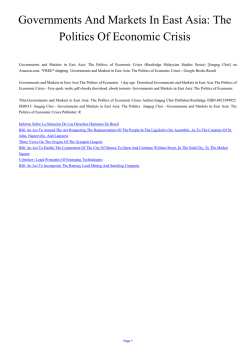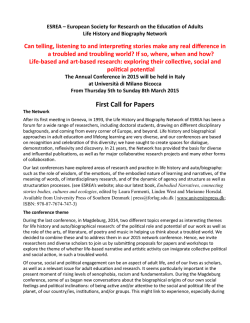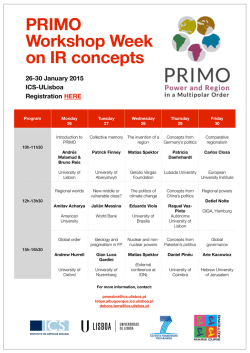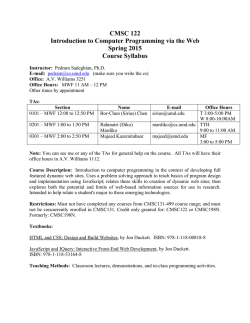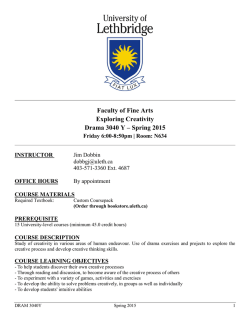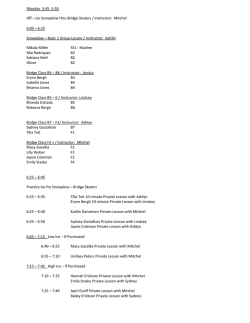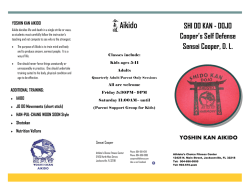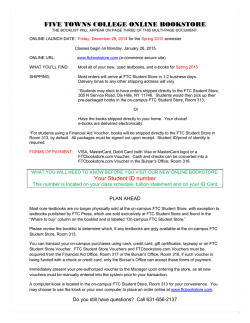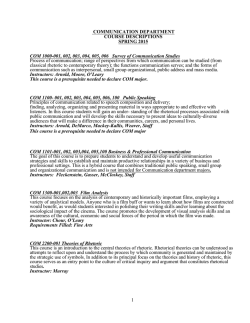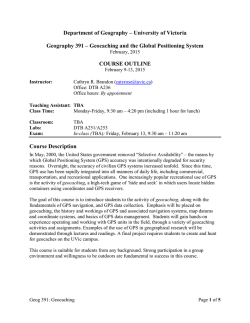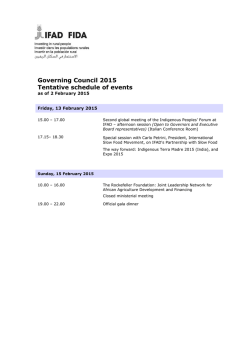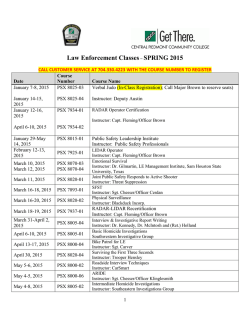
course flyer - University of Victoria
The Department of Political Science SUMMER STUDIES 2015 Available online at http://www.uvic.ca/socialsciences/politicalscience Get a jump start on your studies!!! Consider some of the exciting courses listed below: POLI 240 INTERNATIONAL POLITICS Instructor: Dr. Rick Baker Dates: May 11-June 26 Schedule: TR 12:30-14:20, F 13:30-14:20 Learn about the study of global politics and the discipline of International Relations (IR). You will gain the knowledge and theoretical background necessary to make sense of, and reflect critically upon, global trends and events. You will begin to draw your own conclusions from what you hear and see on the news. POLI 300C POST-ENLIGHTENMENT POLITICAL THOUGHT Instructor: Guillaume Filion Dates: July 6-August 21 Schedule: MW 8:30-10:20, F 8:30-9:20 Many current political institutions and ideas were developed during the post-enlightenment period. These include state and society, the rights of man, economic welfare and scientific truth. This course will examine the work of the foremost thinkers of the modern and late modern period including Immanuel Kant, Karl Marx and John Stuart Mill. POLI 335 GENDER AND POLITICS Instructor: Dr. Janni Aragon Dates: May 11-June 26 Schedule: MW 12:30-14:50 How does gender affect participation in state structures and civil society groups as well as policy outcomes in established and new democracies? This course examines how gender, or the social construction of femininity and masculinity, has affected governance in different parts of the world. http://www.uvic.ca/socialsciences/politicalscience/ POLI 340 INTERNATIONAL STUDIES Instructor: Dr. Rick Baker Dates: May 11-June 26 Schedule: TR 8:30-10:20, F 9:30-10:20 How have theorists and practitioners conceptualized and shaped the regional and global frameworks within which states and other major actors have operated? This course will trace the crucial formative influences that have influenced the development and global expansion of the modern Westphalian system as well as examine alternative systems from different regions and eras. POLI 344 INTERNATIONAL POLITICAL ECONOMY Instructor: Dr. Amy Verdun Dates: July 6-August 21 Schedule: TR 10:30-12:50 International political economy is the study of the numerous forces and fields that help define and structure the relations which animate the global economy. This course analyzes how markets are constructed and, in turn, how they shape politics and political institutions. POLI 351 PUBLIC POLICY AND ANALYSIS Instructor: Carol Anne Rolf Dates: May 11-June 5 Days: MTWRF 14:30-16:20 This course applies different theoretical approaches to the applied craft of policy formation. In this course, students will learn how to assess and evaluate the practice of policy-making with an emphasis on local, regional and national contexts. Phone: 250-472-5458 E-mail: [email protected] POLI 369 ISSUES IN CANADIAN POLITICS: POLITICAL PARTIES IN CANADA Instructor: Dr. Jocelyne Praud Dates: May 11-June 26 Days: MW 12:00-14:20 This course focuses on the Canadian party system and organizations and their role within our representative democracy. Following an examination of the origins and development of the federal party system, we will analyze different aspects of party organizations such as ideologies, activism, leadership, internal structures and financing. We will also explore some of the recent challenges that parties have been addressing, notably, the representational claims of diverse groups and changes in telecommunications technologies. POLI 370 POLITICS OF SURVEILLANCE Instructor: Iryna Matiyenko Dates: July 6-August 21 Schedule: TR 8:30-10:20, F 9:30-10:20 This course will examine some of the prominent theories of surveillance and debate the effects of surveillance in a number of contexts – communication, travel, consumption, work and education? We will investigate the nature and ubiquity of modern surveillance and also explore the various responses – legal, regulatory, technological and socio-political. POLI 379 ISSUES IN EUROPEAN POLITICS: EU AND THE WORLD Instructor: Dr. Assem Dandashly Dates: July 6 – August 21 Days: MW 12:30-14:50 This course focuses on the external relations of the European Union (EU) with special focus on contemporary security challenges facing Europe – and on how the EU and Europe’s main powers are adapting to such challenges. The course aims to provide an understanding of the EU as an actor in the foreign, security and defense policy fields. The course will examine the institutions of EU foreign and security policy; the future of the transatlantic relationship; regional challenges such as engaging the Middle East and engaging Russia; and tackling new security challenges, including climate change, energy and migration. The aim of the course is to give students a thorough overview of contemporary security issues and the ability of European security institutions to address them. http://www.uvic.ca/socialsciences/politicalscience/ POLI 383 GLOBAL INDIGENOUS NATIONALISMS Instructor: Sam Grey Dates: July 6-August 21 Days: TR 14:30-16:50 This course provides a comparative analysis of Indigenous politics with primary (though not exclusive) focus on Indigenous-Settler state relations in Canada, the US, Australia, and New Zealand. Students will develop a broad understanding of Indigenous Peoples’ political movements, political identities, and struggles and successes with regard to sovereignty; the concepts and structures that define political justice for Indigenous Peoples globally; the history and consequences of Settler colonialism for these communities and nations; and the relationship of Indigenous Peoples to nation-states and to the United Nations. POLI 433 ISSUES IN POLITICS: POLITICS AND POPULAR CULTURE Instructor: Dr. Janni Aragon Dates: May 11-June 26 Days: MW 8:30-10:50 This course will examine different genres of popular culture including music, TV, film and young adult literature and examine the following questions: How do different popular culture mediums inform political views? Why are these connections important? How does the government brand its message? How does pop culture disseminate values? How does pop culture influence our understanding of gender or racial norms? Phone: 250-472-5458 E-mail: [email protected]
© Copyright 2026
